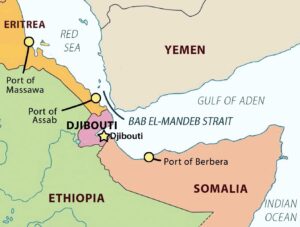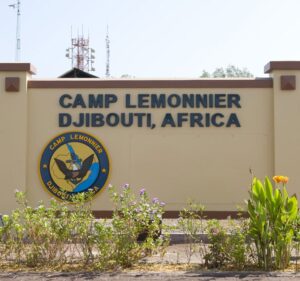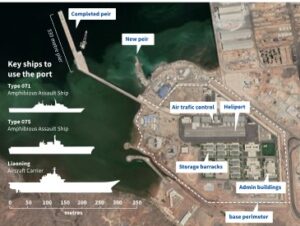
Pic courtesy: Britanica
Djibouti
Djibouti, is a small country in the Horn of Africa located on the southwest shores of the Gulf of Aden. It is adjacent to the narrow Bab el-Mandeb Strait (mere 18 miles wide at its narrowest point) the gateway to the Red Sea and the Suez Canal.
Djibouti is sparsely populated with a rocky landscape and harsh climate. It has minimal natural resources, limited arable soil or vegetation, and temperatures that reach 50 degrees plus.
Djibouti is governed by a neo-patrimonial system of government. A neo-patrimonial system is a form of governance in which all power flows directly from the leader.
The Government of Djibouti controls all aspects of Djiboutian infrastructure and state apparatus. Government offices are determined not necessarily by merit but by lineage, ethnicity, and power balances.
Djibouti is located in a difficult neighborhood. Its neighbors Eritrea, Ethiopia, and Somalia have undergone disabling political unrest throughout the last 20 years.
-
- Eritrea is under financial sanctions and likened to an “African North Korea.”
-
- Somaliland, while stable, is still not recognized by the United Nations (UN) or the African Union as a separate country from Somalia, leaving it painted as a war-torn, terrorist-ridden fragile state.
-
- Yemen has been in the middle of a civil war since 2015.
Djibouti has development challenges, including high rates of severe malnutrition and poor health infrastructure. But its rank of 166th on the 2022 United Nations Human Development Index report places Djibouti ahead of all its neighbours. Djibouti remains an anchor of stability in a volatile region.
Strategic Location

Djibouti’s biggest advantage is its geostrategic location near the Bab el-Mandeb strait. Positioned between the Arabian Peninsula and the Horn of Africa, the strait is the major feature that sets Djibouti apart from other African countries. Bab el-Mandeb connects the Red Sea and the Gulf of Aden and links the Indian Ocean and the Mediterranean, making it the main maritime passage and trading route between the East and West halves of the globe.
Djibouti provides critical logistics access to the Bab el-Mandeb Strait, the Gulf of Aden, and other key locations in the region.
Ships transiting between the Suez Canal and the Indian Ocean pass through the strait, making this waterway a key choke point. Approximately 30 percent of the world’s trade moves through this critical waterway. Closure of the strait results in an increase in travel time by 11 to almost 26 days, with an attendant, increased transit costs.
Port of Djibouti

Pic Courtesy: Insight
Work on the port started in 1897 and the port infrastructure and operating capacity grew rapidly over the years.
The country’s international trade is centered on its ports and the Free Trade Zone, accounting for 80–90 percent of the country’s economy.
Djibouti’s ambitions have continued to grow, and in 2020, the country has implemented the Port-Park-City model. This model includes:
(1) Full integration of the country’s ports that transport goods.
(2) Industrial parks (international free trade zone that brings value to these goods).
(3) Services that facilitate the financial transactions of those goods.
Foreign Military Bases

Pic Courtesy: Gatewayhouse
Djibouti faced bankruptcy in 1999, and its political leader capitalized on the country’s strategic location by offering land for rent to foreign militaries.
Following the terror attacks on September 11, 2001, the United States needed a location near the West Asia to combat terrorism and assist operations in Afghanistan and the West Asia, and it was willing to pay. After this, other countries also saw Djibouti’s value and formally established bases (or a military presence).
There are seven foreign military bases and the revenue from foreign military bases is estimated to be approx. $130 million.
Each country has a slightly different mission depending on its requirements.
-
- Germany, Spain, and Japan patrol against piracy.
-
- France, which hosts German and Spanish units on its base, provides air protection.
-
- Italy uses its Djibouti base to support the development of Djiboutian and Somali police for regional security efforts.
-
- United States uses it to focus on counterterrorism and occasional counterpiracy activities.
US Camp

Pic Courtesy: Milbases
Camp Lemonnier was originally a French Foreign Legion camp that was handed over to the Djiboutian military after independence. It is on the south side of the Djibouti-Ambouli International Airport runway.
It was leased by the United States in 2001, and is one of the largest bases in the Horn of Africa. Camp Lemonnier is a hub for counterterrorism, contingency, and antipiracy operations, and is a resupply location for US troops in Africa.
The base also serves as a host and launch pad for joint exercises.
The United States provided over $14 million in aid to Djibouti in FY2021, and the $16 million requested in FY2023 included $9 million in developmental aid and $6 million in military aid in addition to funding allocated specifically for security assistance.
Chinese Base

Pic Courtesy: Memri
Only a year after the United States signed its long-term lease agreement in 2014, China requested land to build a new military base as part of its systematic, pan-African approach to security on the continent.
Djibouti subsequently agreed, and on August 1, 2017, China inaugurated its first base in Africa, located about 8 miles from the US base.
The base supports peacekeepers, maritime security, and humanitarian missions and maintains several piers for visiting military vessels. The largest pier is 1,120-feet long, big enough to accommodate a Chinese aircraft carrier, assault carriers, and nuclear submarines.
Tug of War
Djibouti is the only location where US and Chinese militaries are based within just a few miles of each other. In the years since China opened its base, the continued proximity of their troops combined with China’s economic ties to Djibouti is a cause of dismay for US policymakers.
While the Chinese military base is seen as a potential threat to US interests, the greater risk is China’s potential economic stranglehold on Djibouti’s economy and, therefore, its political system.
Djibouti’s increasing reliance on China for financing infrastructure projects, including the Doraleh Multipurpose Port, has left the small country heavily indebted to its Asian partner.
US policymakers fear Djibouti’s increasing debt to China may also cause it to become ensnared in China’s “debt-trap” diplomacy. In that case, Djibouti’s infrastructure, particularly its ports, could be handed over to the Chinese if the country cannot repay its loans. Parallels have been drawn between the Chinese-funded modernization of ports in Djibouti and Sri Lanka.
Djibouti is becoming less dependent on US alone. As a result, the US freedom of maneuver within the country is shrinking as more militaries are competing for training areas, runway, air space, and other infrastructure.
Conclusion
The almost perfect location of Djibouti on the Bab el-Mandeb Strait, alongside the country’s current political stability in a historically volatile region, is a strong combination that continues to maintain the importance of Djibouti in the region.
Djibouti has used its geo-strategic location to its advantage by leasing its infrastructure and land for foreign military bases.
The presence of Chinese and US bases in close proximity is creating a conflict of interest.
While Djibouti’s total revenue from military base leasing activities, airport, and port contracts is unclear, the loss of this revenue would undoubtedly debilitate its economy.
Question
Will Djibouti become the Singapore of Africa in future?
Suggestions and value additions are most welcome
For regular updates, please register here
References and credits
To all the online sites and channels.
Disclaimer:
Information and data included in the blog are for educational & non-commercial purposes only and have been carefully adapted, excerpted, or edited from sources deemed reliable and accurate. All copyrighted material belongs to respective owners and is provided only for purposes of wider dissemination.

Very informative.
The only saving grace (currently) is the presence of five other military bases to China and the US. With China turying to wean MBS, SA could well sway away from its traditional US support.
Thanks for bringing to fore an issue that needs attention – the Suez gateway is too important to ignore